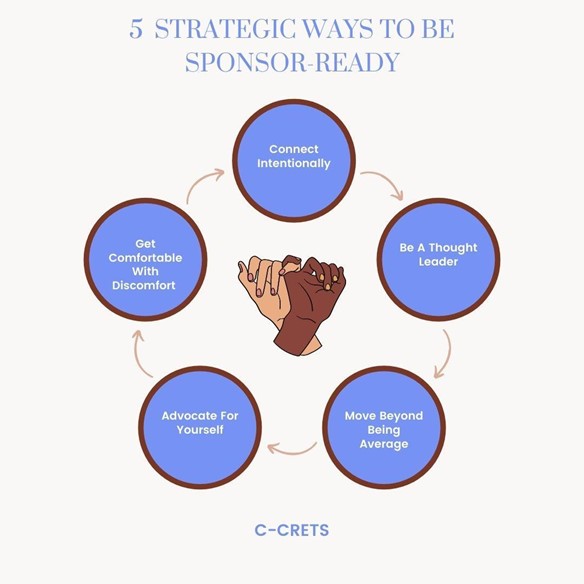This week’s article is provided by Ricky Robinson, Keith Powell, and Jenelle Jack of C-Crets. It is a companion to Ricky and Keith’s interview on Innovating Leadership, Co-creating Our Future titled Sponsor and Being Sponsor Ready that aired on Tuesday, August 17th.
What if connecting with just one person could turn your career around?
It’s more than possible. Corporate executives find success all the time, doing exactly that. A chance meeting or invitation for a drink can lead to a key introduction, or even an offer for a higher position.
Many people see finding a good mentor as critical to their professional advancement when perhaps they’d be better off establishing a relationship with a sponsor—a senior-level advocate who can provide the support needed to move your career forward.
A mentor gives you advice and encouragement on your professional journey, and is typically useful in terms of your technical growth. They typically work in the background, answer your questions and share their personal experiences to help guide you on.
Sponsors, however, have the real power to propel your career. In the corporate world, they speak and advocate on your behalf, and provide a link to the people on the path ahead. Having a sponsor in your corner is often the difference between slowly scaling the corporate ladder and grabbing a seat on the fast track to upper management. Effectively, the sponsor is in front helping to lead you forward.
Sponsorship can impact your wallet. According to a study by Payscale, there is a “sponsorship premium,” which boosts the salaries of their protégés. For example, Hispanic women with a sponsor earn 6.1% more than Hispanic women without one, while African-American women with a sponsor earn 5.1% more than their counterparts.
So, what are some key characteristics of a sponsor?
First, sponsors are willing to share valuable resources with their protégés. These are the same resources that they themselves use, whether it’s marketing collateral, network access, or the contact information of their executive coach.
Another important quality of sponsors is that they will put their professional credibility on the line by advocating for you even when you’re not in the room for stretch assignments, promotional opportunities, and/or inclusion on succession plans.
They will invite you to important meetings so that you can get a first-hand view of leadership and are positioned to gain insights from the discussion. You may also be invited to social outings that give you access to persons you wouldn’t connect with otherwise.
Further, sponsors have no problem giving you high visibility projects, along with the credit for their successful execution.
A sponsor might ask you to represent the company on public platforms, whether it’s at a function for a nonprofit organization, a conference, or a media event. The aim is to support your career advancement.
To benefit from the support they can give, you should first be able to identify a potentially good sponsor. Look at the leader’s willingness to share resources, whether they’re interested in connecting subordinates with others, assign tasks that enable professional growth, and publicly praise subordinates.
But before you can gain access to a sponsor who can liaise with others on your behalf, you’ll have to position yourself.
Five C-CRETS To Be Sponsor-Ready
Connect Intentionally
This may mean accepting the new team project that will require extra hours of work because you know a senior manager is overseeing it and your visibility will increase with the team’s success.
Taking on additional responsibility and participating in work-related projects can support your desire to connect directly with a potential sponsor. It’ll also allow you to showcase your leadership skills and demonstrate the value that you bring to the company.
Be a Thought Leader
Share your opinions, take action and encourage other colleagues to be proactive too. When you share your thoughts with others, they’re more likely to be interested in what you have to contribute. These are the types of employees who get invited to speaking events, participate in board meetings, and lead webinars and other work functions. Sponsors want to see that you can clearly articulate information.
Move Beyond Being Average
The employee who exceeds expectations and who puts points on the board that benefits the company will be seen by a potential protege. At the end of the day, a leader is risking his or her reputation by advocating on your behalf. Therefore, you must not only perform well in your role or simply do what’s expected, but you must also demonstrate excellence.
Advocate for Yourself
The high-value employee not only adds value to the company, but can articulate their specific skill sets and how they continue to contribute to the company. Having the ability to vocalize your value proposition is important and eliminates any doubts a potential sponsor may have about your abilities. Sometimes, especially in larger organizations, it’s harder to spot good work unless the employee speaks out. By sharing your wins, you can create more opportunities for yourself.
Get Comfortable with Discomfort
Many people only want to do what is expected of them at work, but it’s discomfort that’s often the catalyst for growth. For an employee this might mean working longer hours than usual to complete a task, being asked to prepare and present on a topic at an upcoming meeting, or being placed on a project you don’t quite feel qualified to take on. Any diversion from a comfortable routine is often seen as an obstacle, but discomfort will also give you an opportunity to expand your horizons. Be willing to endure temporary discomfort and you’ll stand out even more among your colleagues.
Part of finding a sponsor is being prepared for one when they show up.
You can increase your chances of finding a sponsor, as opposed to just a mentor, by implementing the five strategic tips outlined above. This will take additional effort on your part, but it’s worth every penny of the payoff you’ll earn in terms of professional growth, networking opportunities, and career advancement.
Recommended Resources:
Sponsors: Valuable Allies Not Everyone Has – Compensation Research (payscale.com)
C-CRETS Podcast: Season 3, Episode 1 – Are you Sponsor Ready?
To become a more innovative leader, you can begin by taking our free leadership assessments and then enrolling in our online leadership development program.
Check out the companion interview and past episodes of Innovating Leadership, Co-creating Our Future, via iTunes, TuneIn, Stitcher, Spotify, Amazon Music, Audible, iHeartRADIO, and NPR One. Stay up-to-date on new shows airing by following the Innovative Leadership Institute LinkedIn.
About the Authors
Ricky Robinson is a Vice President of Human Resources for a $35B leader in the Medical Device industry. His 20+ year career has afforded him leadership roles in Human Resources for some best in class global organizations spanning industries from commercial goods, retail, smart home industries and med tech. Ricky is extremely familiar with being the “Sole Brother” on the Executive Leadership Team quite often challenging diversity, inclusion and unconscious bias issues within Corporate America, as an advocate and sponsor for underrepresented groups. Having spent his career as a mentor and coach, he continues to share the tips and tricks that help underrepresented employees reach their full potential as a co-founder of C-CRETS (www.c-crets.com), which is a career advice platform offering career coaching services, online courses and topical content through blogs and a podcast.
Keith Powell is a Chief Operating Officer in private education with over 20 years corporate experience in the U.S. and Canada. Most of his career, Keith led global Finance and Operations functions for Fortune 1000 companies in the automotive, chemical, consumer and commercial goods, e-commerce, and smart home industries. Keith was the “first” or the “only” quite often climbing the corporate ladder. Having mentored and coached hundreds throughout his career, he continues to share practical, digestible advice to underrepresented employees as a co-founder of C-CRETS (www.c-crets.com), which is a career advice platform offering career coaching services, online courses and topical content through blogs and a podcast.
Jenelle Jack is a Trinidad-born, Maryland-raised content writer and book coach who supports business owners and professionals in building their business by creating relevant content that can stand the test of time. Jenelle is passionate about helping people create impact, grow their platform and maximize their message to reach more of their intended community.
Photo by Lagos Techie on Unsplash







